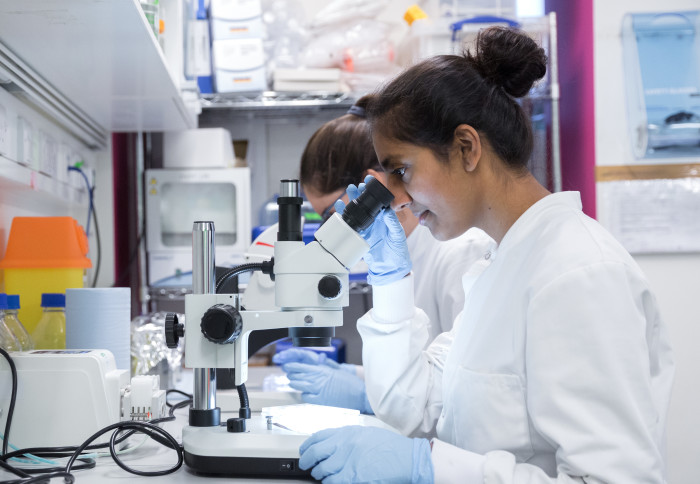Imperial begins South Asia search for women scientists in climate and energy

Imperial is launching new academic fellowships in climate and energy for women scientists from South Asia.
The academic fellowships are part of the College’s Transition to Zero Pollution initiative and are funded by the British Council Scholarships for Women in STEM.
The Fellowships will enable researchers to take up a visiting research placement for six to 12 months at Imperial in one of the following institutes or departments:
- Centre for Environmental Policy
- Department of Earth Science and Engineering
- Energy Futures Lab
- Grantham Institute - Climate Change and the Environment
There are four fully-funded placements available to recent PhD graduates from Bangladesh, India, Nepal, Pakistan or Sri Lanka, who would otherwise not have the financial resources to study in London.
The Fellowships have been created with the aim to help address the under-representation of women in STEM. Applicants will be required to demonstrate how they would inspire future generations of women to pursue a career in STEM.
Transition to Zero Pollution is a pioneering programme in research, education and innovation to help society realise a sustainable zero pollution future.
The project will inspire fundamental changes in areas such as the way materials are used in manufacturing, how we produce food and energy, and will help mitigate the impact of air pollution on people's health.
Professor Mary Ryan, Interim Vice-Provost (Research and Enterprise) and lead of Imperial’s Transition to Zero Pollution, said: “Global pollution, climate change and sustainable energy are some of the biggest challenges facing society.
“To solve these global issues we need diverse teams of people working together that can bring new and fresh ideas, yet women have been underrepresented in science and engineering for many years.
"These Fellowships will enable talented women scientists from South Asia to develop their research and innovations here in London as we strive towards a zero-pollution society.”
Find out more and apply for the Fellowships
Imperial’s South Asian stars
Imperial has a growing network of inspiring alumni in South Asia working to improve society. Some of them reflect here on their experiences at the College and why they chose to study in London:

Dr Janani Srree Murallidharan (Research Assistant, Mech Eng, 2015), is now an Assistant Professor at the Indian Institute of Technology Bombay.
Janani said: "Imperial is well known for its research in cutting edge and newly evolving engineering sciences, as well as for its emphasis and focus on innovation with aims towards contributing to solving social and industrial problems.
"While pursuing my research at Imperial I had the opportunity to attend world renowned workshops where we could discuss our research work and obtain feedback on the way forward.
"Imperial is well known for its research in cutting edge and newly evolving engineering sciences" Dr Janani Srree Murallidharan (Research Assistant, Mech Eng, 2015)
"I was also part of a large research group of extremely talented individuals, so every day was an opportunity to exchange research ideas.
"London is also home to world renowned libraries which enabled me to access old archived journals that I couldn’t find online. Such access helped my research tremendously."

Dr Sonali Senaratna Sellamuttu (PhD Centre for Environmental Policy, 2004), is the Country Representative for Sri Lanka and Team Lead for the Green Climate Fund National Adaptation Plan (NAP) Readiness Support Project; Green Growth Planning and Implementation.
"Imperial had the kind of multi-disciplinary research group, promoting the sustainable use of natural resources, that I was looking for to conduct my PhD research" Dr Sonali Senaratna Sellamuttu (PhD Centre for Environmental Policy, 2004)
Sonali said: "I decided to study at Imperial because it was not only a top-ranked university in the UK, but it also had the kind of multi-disciplinary research group, promoting the sustainable use of natural resources, that I was looking for to conduct my PhD research, under the supervision of an internationally renowned faculty member.
"There were students from many nationalities represented in our group and it was a very friendly and collegial atmosphere.
"London is a melting pot with a vibrant multicultural flavour. There was so much to experience – from art, concerts, theatre, and museums to a variety of cafes and restaurants serving a range of cuisines from all over the world."
 Dr Gaya Ranawaka (PhD Life Sciences, 1992), is a Professor in the Department of Zoology at the Open University of Sri Lanka
Dr Gaya Ranawaka (PhD Life Sciences, 1992), is a Professor in the Department of Zoology at the Open University of Sri Lanka
Gaya said: "I chose Imperial because of its reputation as one of the top universities in the UK and it was highly recommended by my professors.
"It was my first time living alone away from family, but after a few months I didn’t feel alone because of London’s multicultural diverse society" Professor Gaya Ranawaka (PhD Life Sciences,1992)
"It not only trained me on the skills and techniques that I needed to be a successful researcher, but more importantly it provided me the opportunity to learn what I was capable of and be an independent and confident person.
"It was my first time living alone away from family, but after a few months I didn’t feel alone because of London’s multicultural diverse society and there was so much to do when I stepped out from the hall of residence.
"There is so much on offer at Imperial and you can expect a challenging and rewarding experience at this prestigious university."
Article text (excluding photos or graphics) © Imperial College London.
Photos and graphics subject to third party copyright used with permission or © Imperial College London.
Reporter
Stephen Johns
Communications Division